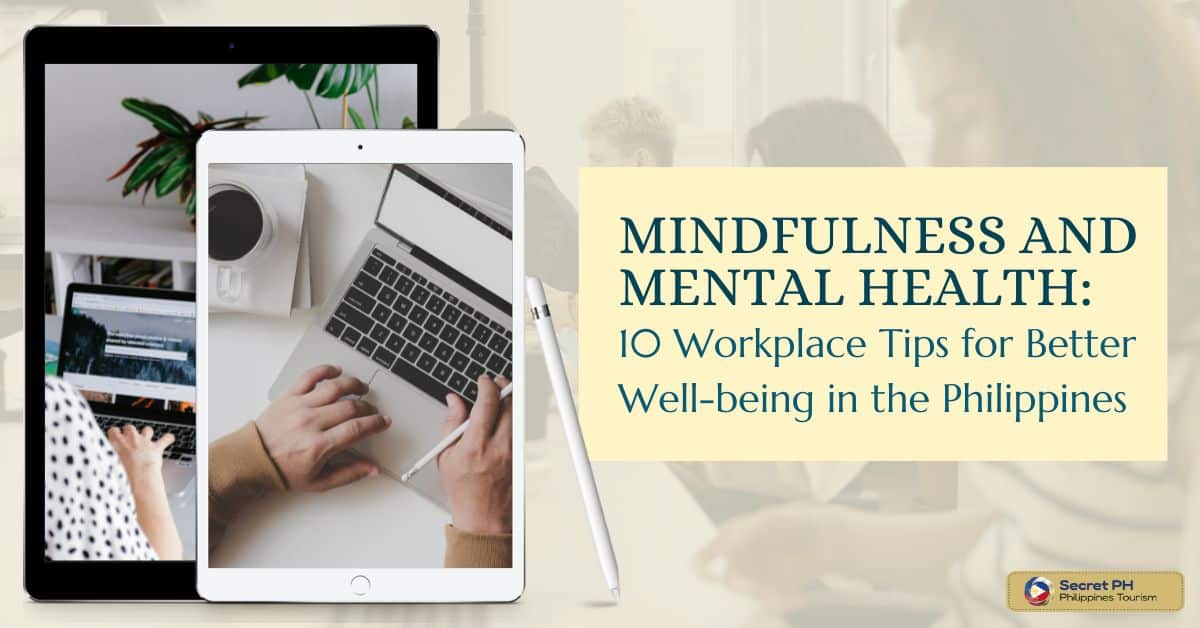The daily grind at work can take its toll. It’s easy to become overwhelmed and overworked, leading to increased stress levels. To promote better well-being in the workplace, it is important to incorporate healthy practices rooted in mindfulness and mental health.
Here are 10 tips on how you can do this in the Philippines: establishing a daily routine, taking regular breaks, making time for quiet reflection, and more. With these tips, you can work towards a healthier and happier workplace.

1. Establish a Daily Routine
Establishing a daily routine is crucial for maintaining good mental health and well-being, especially in the workplace. A daily routine helps us to become more organized and productive, which can lead to a sense of accomplishment and satisfaction at the end of each day. It also helps us to manage our time better, allowing us to prioritize tasks that are important and urgent.
Reduced stress
Establishing a routine can help reduce stress by providing structure and giving you something to look forward to. Knowing what you have to do and when helps to create a sense of control and reduce the stress associated with uncertainty.
Increased productivity
Because you have an organized plan, it’s easier to stay focused and get tasks done in a timely manner. With a routine in place, it’s easier to manage workloads and avoid distractions.

2. Take Regular Breaks Throughout the Day
As workers in the Philippines, it can be easy to get caught up in the hustle and bustle of a busy workday. However, taking regular breaks throughout the day is crucial for maintaining good physical and mental health. Here are two reasons why:
Boosting Productivity
It may seem counterintuitive, but taking breaks can actually help improve productivity. Studies have shown that taking short breaks throughout the workday can help reduce stress and increase focus.
Preventing Burnout
Working long hours without breaks can lead to burnout, which is a state of emotional, physical, and mental exhaustion caused by prolonged stress.

3. Make Time for Quiet Reflection
In today’s fast-paced world, it can be easy to get caught up in the daily grind and forget to take time for oneself. However, taking a few moments each day to engage in quiet reflection can have numerous benefits for one’s well-being. Here are the reasons why:
Improved Mental Health
Quiet reflection can help reduce stress and anxiety, allowing individuals to clear their minds and focus on the present moment. It can also provide an opportunity for self-reflection.
Increased Creativity
Engaging in quiet reflection can also stimulate creativity by providing individuals with the space and time needed to generate new ideas and perspectives.

4. Let Go of Perfectionism
Perfectionism is a personality trait that involves setting extremely high standards for oneself and striving to meet them at all costs. While it may seem like a positive trait, perfectionism can actually have negative effects on mental health and well-being. Here are some reasons why letting go of perfectionism is important:
Reduces Stress
Perfectionists often put a lot of pressure on themselves to succeed, which can lead to chronic stress and anxiety. By letting go of the need to be perfect, individuals can reduce their stress levels and improve their overall well-being.
Promotes Creativity
When people focus too much on being perfect, they may limit their creativity and ability to take risks. Letting go of perfectionism allows individuals to explore new ideas and approaches without fear of failure.

5. Practice Self-Care
Working in the Philippines can be demanding, which often leads to neglecting self-care practices. However, taking care of yourself is crucial to maintain good mental health and well-being, especially in a fast-paced work environment. Here are some reasons why self-care is essential:
Reduces Stress and Prevents Burnout
Stress is a common problem among employees in the Philippines. Practicing self-care activities like meditation, exercise, or even just taking breaks throughout your workday can significantly reduce stress levels.
Increases Productivity and Job Satisfaction
When you prioritize self-care, you are more likely to have higher job satisfaction and increased productivity at work. Taking care of yourself means that you can perform better at your job while maintaining a healthy work-life balance.

6. Exercise Regularly
Physical exercise is crucial not only for maintaining a healthy body but also for promoting mental health and well-being. In today’s fast-paced world, it’s easy to neglect exercise due to work demands and busy schedules. However, incorporating regular physical activity into your daily routine can significantly improve your mental health and well-being, especially in the workplace.
Reduces Stress and Anxiety
Stress and anxiety are common problems faced by individuals in the workplace. Exercise is an excellent way to combat stress as it releases endorphins, which are natural mood boosters that reduce stress levels. Regular exercise also reduces cortisol levels, a hormone associated with the stress response.
Increases Productivity and Energy Levels
Exercise improves blood flow, which increases oxygen supply to the brain, leading to enhanced cognitive function. This means that regular physical activity can help you stay alert, focused, creative, and productive at work.

7. Make Connections with Coworkers
Making meaningful connections with your coworkers can significantly improve your mental health and well-being, especially in the workplace. Here are some reasons why it is important to foster these relationships:
Improves Morale
Having supportive relationships with colleagues can have a positive effect on morale. This includes feeling appreciated, supported, and respected by those around you.
Increases Productivity
Having strong interpersonal relationships can lead to increased productivity within the workplace. Working together with people you trust and respect helps to create a positive work environment, which is conducive to productivity.

8. Unplug from Technology at Times
It is important to take time to unplug from technology at times, especially in the workplace. Technology can be both a blessing and a curse, as it has made our lives easier in many ways but also created distractions and increased levels of stress. Here are some tips for unplugging from technology in the workplace:
Set Boundaries
Establish boundaries between work and leisure time by avoiding the use of technology outside of work hours. This will help to reduce stress levels and promote better well-being.
Limit Social Media Use
Social media can be a major distraction, so it is important to limit your usage when at work. If needed, set specific times during the day for checking social media accounts.

9. Focus on the Positive
Maintaining good mental health is crucial to overall well-being, and it’s especially important in the workplace. In the Philippines, where work culture can be fast-paced and stressful, it’s more important than ever to focus on the positive aspects of work to maintain a healthy mindset. Here are two reasons why:
Boosts Employee Morale
Focusing on positive aspects of work can significantly boost employee morale. When employees feel appreciated and valued for their contributions, they are more likely to have a positive attitude toward their work.
Reduces Stress Levels
Stress is one of the leading causes of poor mental health among employees in the Philippines. By focusing on positive aspects of work, such as accomplishments, progress, or even small wins, employees can reduce stress levels and improve their overall well-being.

10. Seek Professional Support as Needed
It is important to remember that there is no shame in seeking professional help if needed. Mental health issues can be difficult to cope with and can have a significant impact on work performance. If you are struggling with mental health issues, it is important to seek help from a qualified medical or mental health practitioner. Here are some tips for finding the right support:
Research Your Options
Do your research to find the best professional for you. Look for reviews and recommendations from people you trust. You can also look for professionals who specialize in the area that you are struggling with, such as depression or anxiety.
Talk to Friends & Family
Sometimes it can be helpful to talk to someone who is close to you. Friends and family can provide emotional support and understanding, as well as offer advice on where to find the right help.

In Conclusion
Incorporating healthy practices rooted in mindfulness and mental health into the workplace is crucial for promoting better well-being. From establishing a daily routine to focusing on the positive are all important steps one can take to ensure good mental health in the workplace.
Finally, it is important to seek professional help as needed if you are struggling with mental health issues. By utilizing these tips, we can work towards a healthier and happier workplace in the Philippines.








